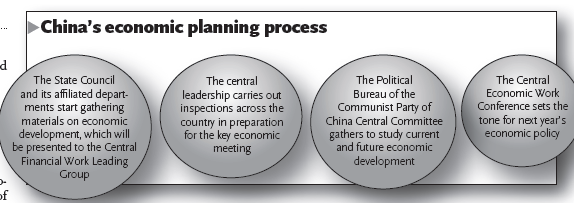HOME >> BUSINESS
Meeting sets economic goals
By Li Qiaoyi Source:Global Times Published: 2013-12-10 19:47:00

A man visits a housing expo in Yichang, Central China’s Hubei Province Thursday, during the Mid-Autumn Festival. A total of 12,900 units of new homes were sold in 54 major cities during the three-day holidays, a rise of 18 percent from the three-day Dragon Boat Day holidays on June 10-12, Shanghai-based Securities Journal reported Monday citing the latest statistics from Centaline Property Research Center. Photo: IC

Graphics: GT
China's top leadership on Tuesday lifted the curtain on the annual Central Economic Work Conference that reviews the country's economic work in 2013 while setting the tone for next year's economic policies.While downplaying the need to be overly keen on the 2014 GDP growth target to be agreed at the conference, economists noted the conference comes a month after reform pledges made at the Third Plenum of the Communist Party of China (CPC) Central Committee and therefore will certainly focus on rebalancing the economy and advancing reform.
The fruits of this year's conference, held for two or three days according to previous years' traditions, are expected to be announced on the day of its conclusion.
Market watchers generally expressed their confidence in the economy being able to achieve this year's growth target and estimated the government may maintain its 7.5 percent growth target for next year.
It is no surprise that China will achieve this year's growth goal of 7.5 percent, Li Xuesong, a deputy director of the Institute of Quantitative and Technical Economics under the Chinese Academy of Social Sciences (CASS), said at the press conference for the release of The Economic Bluebook: Analysis and Forecast of China's Economy in 2014 on Tuesday.
Issued by CASS, the blue book forecasts 7.7 percent growth this year trending downward to average about 7.5 percent in 2014 as the government focuses on reforms and economic restructuring.
"The economy has the potential to retain its growth momentum next year, and therefore it's not necessary for the government to cut the growth target," said Tang Jianwei, a senior macroeconomic analyst at the Bank of Communications in Shanghai.
An improvement in the external environment - a continued recovery in the US and European markets - for next year will boost the Chinese economy, he told the Global Times.
"Keeping rather than changing [the growth target] should help to stabilize market sentiment as the government shifts its focus to promoting reforms post the Third Plenum," Chang Jian, China economist at Barclays Capital in Hong Kong, wrote in a research report sent to the Global Times Tuesday.
Next year's growth targets agreed at the annual conference will not be officially announced until the following March when the government work report is delivered by the premier.
But some economists meanwhile suggested there is also a chance that to expedite reforms, the government will set a slower growth target.
The 2014 growth target may be lowered to about 7 percent, Li Wei, China economist at Standard Chartered Bank in Shanghai, told the Global Times on Tuesday.
"A lowered growth goal, which could stabilize the employment market, would actually envision a scenario befitting longer-term reforms, albeit at the cost of short-term growth," he said.
Focusing more on growth quality that fosters a greener economy may also weigh down the target, Tang said.
Growing concerns over air pollution and other environmental issues will pressure the central government to harness economic growth, he said.
The significance of pure GDP growth figures has already been lowered following the conclusion of the Party plenum, which sent unambiguous signals on pressing forward with deepening economic reforms, Zhang Lei, a Beijing-based macroeconomic analyst with Minsheng Securities, told the Global Times on Tuesday.
In the latest government effort to take a step back from an obsession with GDP growth, the Organization Department of the CPC Central Committee announced in a document that GDP growth rates should not be the only primary indicators for evaluation of local officials' performance and GDP growth rankings must be banned.
"Discussions about how to chart the reform road map to switch to a sustainable growth model driven by domestic demand are expected to be given the main priority," Zhang said.
The role of reform in planning next year's economic development was highlighted at a meeting of the Political Bureau of the CPC Central Committee on December 3. A statement following the gathering said China will continue seeking progress while integrating reforms for all sectors of the country's economic and social development throughout 2014.
Posted in: Business